| Sendedatum | 2009-01-23 23:24:10 |
|---|---|
| Ausgabe | 78 |
hier eine weitere Ausgabe des beliebten Newsletters für Masochisten und Weltuntergangssekten. Je nach Newsreader kann die Darstellung weniger als perfekt befriedigend sein, daher könnte sich ein Blick auf die Onlineversion lohnen, die außerdem verschlagwortet ist.
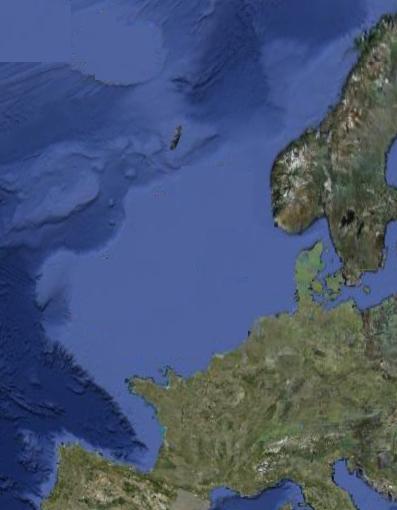
So kommentierte FT Alphaville den Absturz der britischen Banken am 19.1.2009.
Links: Blog und Digest
Inhaltsverzeichnis:
- Sea absorbing less CO2, scientists discover
- Antarctica is warming, not cooling
- AMD Reports Fourth Quarter and Annual Results
- Fab-tool, material markets plummet
- Microsoft stuns with profit miss, to cut 5,000 jobs
- Qimonda ist pleite
- Growing stocks of unsold cars around the world (10 pictures)
- Bankers’ Pay as Sign of the Apocalypse
- Bank picture du jour
- Citigroup Chart of the Day
- Citygroup
- Marktverzerrung am Beispiel WTI
- Not All AA Bonds are the Same
- Spreads zwischen Baa und AAA
- Tranche Warfare
- Saudi's Kingdom Holding posts $8.3 bln Q4 loss
- Canada Factory Sales Fall 6.4% in Record Monthly Drop
- Chinas GDP im Q4 2008
- Chinas Exporte im Dezember 2008
- Bundesbank widerlegt Kreditklemmenthese
- BayernLB erhöht Verlust auf 5 Milliarden
- WestLB will bis zu 100 Mrd. Euro auslagern
- Die Zeitungskrise spitzt sich zu
- Indians Flee Dubai as Dreams Crash - Fall out of Economic Crisis
- India’s street vendors feel the economic woes
- Unicredit versucht sich an einer Kapitalerhöhung
- Japan Exports Plummet Record 35%, Signaling Job Cuts
- Nächster Brandherd Osteuropa
- Polen: First Warsaw-listed firm files for bankruptcy on FX options
- gut für alle Aktionäre und für Rußland
- Moskau fürchtet Nullwachstum
- Russia allows devaluation
- Singapore recession deeper than expected
- Singapore Dec non-oil exports plunge 21 percent
- S. Korean Economy Shrinks 5.6% in Q4
- UK output decreased by 1.5% in Q4 2008
- UK: Das Pfund im freien Fall
- UK: Gross Mortgage Lending
- UK cannot take Iceland's soft option
- UK: Kurze, aber zutreffende Analyse
- RBS
- Roubini Predicts U.S. Losses May Reach $3.6 Trillion
- Money, Liquidity, and Monetary Policy
- Harvard Sale of Private Equity Said to Be Stymied by Price Drop
- USA: Bauerlaubnisse
- USA: How low can homes go? Try $0
- U.S. Vehicle Miles Driven Declines Sharply
- USA: The Lost Decade – Per Capita Net Worth and Living Standards
Inhalt:
The world's oceans soak up about 11bn tonnes of human carbon dioxide pollution each year, about a quarter of all produced, and even a slight weakening of this natural process would leave significantly more CO2 in the atmosphere. That would require countries to adopt much stricter emissions targets to prevent dangerous rises in temperature.
"Our result in the East Sea unequivocally demonstrated that oceanic uptake of CO2 has been directly affected by warming-induced weakening of vertical ventilation," he says. Korea argues that the Sea of Japan should be renamed the East Sea, because it says the former is a legacy of Japan's military expansion in the region.
Lee adds: "In other words, the increase in atmospheric temperature due to global warming can profoundly influence the ocean ventilation, thereby decreasing the uptake rate of CO2."
They compared the dissolved CO2 in the seawater with similar samples collected in 1992 and 1999. The results showed the amount of CO2 absorbed during 1999 to 2007 was half the level recorded from 1992 to 1999.
Crucially, the study revealed that ocean mixing, a process required to deposit carbon in deep water, where it is more likely to stay, appears to have significantly weakened.
Die japanische See nimmt weniger (neues) CO2 auf als früher... und zwar nur noch rund 50% so viel wie früher. Oops. Irgendetwas scheint der Planet gegen uns zu haben.
http://www.agu.org/pubs/crossref/2008/2008GL036118.shtml
Das Problem mit unseren Entscheidungsträgern ist nicht nur, daß natürlich jeder ein erhöhtes Interesse daran hat, daß die anderen sauber sind, während das Eigeninteresse ist, möglich billig möglichst viel Dreck zu machen, sondern vielmehr, daß kaum ein Mensch nichtlineare Systeme wirklich versteht.
Und das oben Beschriebene ist nicht linear.
A review by U.S. scientists of satellite and weather records for Antarctica, which contains 90 percent of the world's ice and would raise world sea levels if it thaws, showed that freezing temperatures had risen by about 0.5 Celsius (0.8 Fahrenheit) since the 1950s.
"The thing you hear all the time is that Antarctica is cooling and that's not the case," said Eric Steig of the University of Washington in Seattle, lead author of the study in Thursday's edition of the journal Nature.
Ich hab' die These, daß die Antarktis abkühlt, schon seit Jahren für sehr zweifelhaft gehalten. Genauer gesagt von dem Moment an, an dem ich sie zuerst hörte...
In the fourth quarter of 2008, AMD reported a net loss of $1.424 billion, or $2.34 per share. For continuing operations, fourth quarter 2008 loss was $1.414 billion, or $2.32 per share, and the operating loss was $1.274 billion. The results for continuing operations include an unfavorable impact of $996 million, or $1.64 per share as described in the table below. Loss from discontinued operations was $10 million, or $0.02 a share.
Umsatz im vierten Quartal: 1.2 Mrd.
Verlust im viert. Quartal: 1.4 Mrd.
Ausblick:
Noch weniger Umsatz.
Insgesamt erinnert mich das an ein Unternehmen, daß gestern den Insolvenzantrag eingereicht hat, und auch recht stark in Sachsen vertreten ist...
http://www.heise.de/newsticker/AMD-tief-im-Minus--/meldung/122211
Heise faßt die letzten Jahre so zusammen:
Q Umsatz Gewinn/Verlust
1/06 1.330 Mio. 185 Mio.
2/06 1.220 Mio. 88,8 Mio.
3/06 1.327 Mio. 134,5 Mio.
4/06 1.773 Mio. -574 Mio.
1/07 1.233 Mio. -611 Mio.
2/07 1.309 Mio. -600 Mio.
3/07 1.632 Mio. -396 Mio.
4/07 1.773 Mio. -1.772 Mio.
1/08 1.505 Mio. -358 Mio.
2/08 1.349 Mio. -1.189 Mio.
3/08 1.585 Mio. -69 Mio.
4/08 1.162 Mio. -1.424 Mio.
Leidensfähigkeit müssen AMD-Aktionäre wohl haben.
Den Ausrüstern der Mikroelektronikindustrie beginnt es schlechter zu gehen:
The three-month average of worldwide bookings were 34 billion yen ($382.7 million) in December, down 32.9 percent sequentially and down 74.2 percent year-to-year, SEAJ said.
book-to-bill kleiner 1 bedeutet, daß es deutlich weniger Aufträge gibt, als verarbeitet werden könnten, und der fette Bereich bedeutet, daß der Auftragseingang binnen eines Jahres um 74% gesunken ist.
Außerhalb Japans sieht es nicht nennenswert besser aus:
Vorweg: ich bin nicht wirklich ein großer Freund von Microsoft. Ich bin auch kein Feind von Microsoft, ich sehe nur eben nicht, warum ich die Produkte der Firma verwenden sollte. Der Zustand hält sich jetzt schon 20 Jahre, offenbar schadet meine Meinung Microsoft nicht besonders
Ich weiß, der Markt hat die Nachricht negativ aufgenommen, aber ich bin ausgesprochen positiv überrascht:
Gerade mal 11.5% weniger Gewinn... und immer noch 4 Mrd. Dollar Gewinn.
Hey, Kinder - das ist Microsoft. _Natürlich_ bekommen die was auf die Nase. Natürlich wird mit jedem nicht verkauften PC weniger Windows verkauft. Natürlich wird momentan weniger sonstige Software verkauft. Natürlich werden weniger Spiele, weniger X-Boxen verkauft.
Und natürlich werden die Zahlen noch schlechter werden.
Aber: Sie sind nicht schlecht. Im Gegenteil, sie beweisen, daß Microsoft abseits des Geschäfts mit neuer Software noch relativ viele Lizenzeinnahmen hat, viele laufende Einnahmen (klar, die werden sich auch verringern - aber langsamer).
Bei allem fehlenden Respekt für Microsoft (und der fehlt mir wirklich): die Zahlen sind relativ gegenüber dem, was von anderswo gemeldet wird, geradezu golden.
"It is pretty bad when things are deteriorating so fast that even the largest companies in the world don't know how rapidly it is happening," said Jefferies analyst Katherine Egbert.
Lieber Analyst: Microsoft hat keine Ahnung, wie die nächste Zeit verlaufen wird. Du auch nicht, und Du müßtest das von Berufs wegen übrigens wissen. Was sagt das nun über Dich?
Analysten sind doch ein strohdoofes Pack.
Es ist wirklich nicht wichtig, ob M$ nun 60 Dollar pro Netbook oder 90 Dollar pro Notebook einnimmt. Wichtig ist nur, ob X*60 + Y*90 > Überlebensminimum.
Und wenn man sich die Formel ansieht, stellt man schnell fest, daß X und Y unabhängig voneinander sieht: Der Besitz eines Notebooks schließt den eines Netbooks nicht aus (und umgekehrt).
Ob Netbooks überhaupt so lange halten wie Notebooks, ist erst mal offen.
Ob es eine Tendenz zum Zweitnetbook geben wird, ist auch offen.
Ob es eventuell in Familien ein Netbook pro Kopf anstelle dem einen Notebook pro 2 Leute geben wird, ist ebenso offen.
Überraschen kann die Nachricht natürlich nicht, aber:
was doch immer wieder überrascht ist die vollständige Unfähigkeit strauchelnder Unternehmen, ihren Kapitalbedarf rechtzeitig zu ermitteln.
Noch am Mittwoch hatten Bund, Land und Unternehmen im Kanzleramt über den zusätzlichen Kapitalbedarf verhandelt. Die Politik sah sich außerstande, die neue Deckungslücke mit öffentlichen Mitteln zu stopfen. Auch die bayerische Landesregierung beteiligte sich zum Schluss an den Gesprächen. München ist Konzernsitz der Qimonda-Mutter Infineon. Aber auch von dort kam keine Hilfe. Presseberichten zufolge war der Qimonda-Eigentümer Infineon nicht in der Lage, das von der Politik verlangte Zukunftskonzept zu finanzieren.
Welch' Wunder. Infineon ist selbst fast pleite, und München muß ja Milliardenlöcher bei der Bayern-LB stopfen.
Der Guardian hat Serie durchaus guter Bilder über die wachsenden Autolagerbestände.
Am Eindrucksvollsten finde ich diese weiterverwertung einer Teststrecke als Lagerplatz:
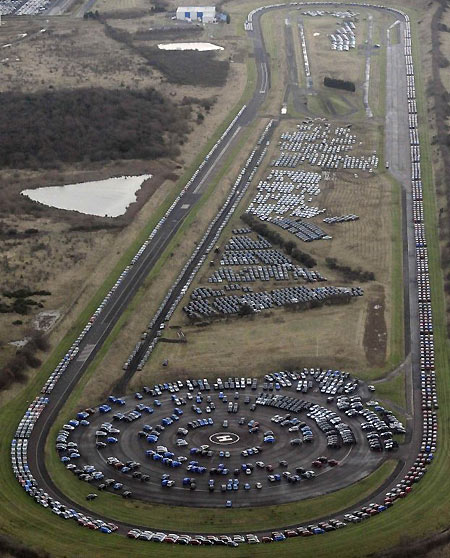
am schönsten jedoch dieses hier:

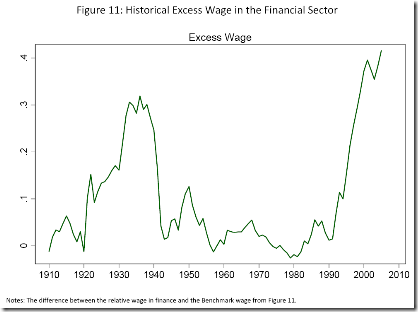
Bankiersgehälter relativ zum Benchmarkgehalt.
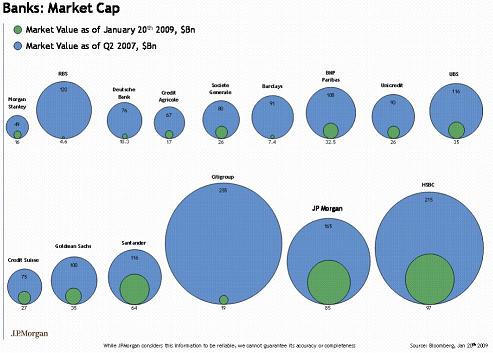
An der obigen Graphik von JP-Morgan gab es einige Kritik, beispielsweise kommt es hier auf die Kreisdurchmesser, nicht auf die Flächen an. Daher hat Alphaville dann noch eine zweite nachgeschoben, in der die Flächen die Kapitalisierungen wiederspiegeln - und hat die dann in der zweiten Hälfte auch noch so normiert, daß die Ausgangsfläche für alle gleich groß ist.
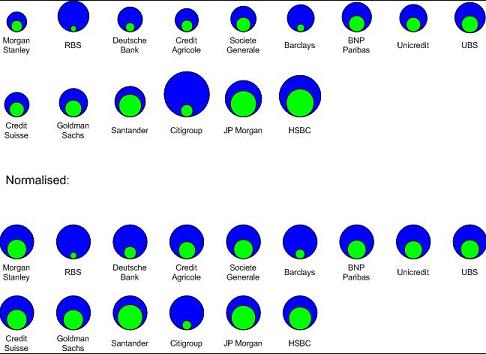
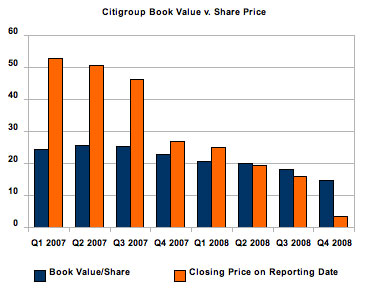
The orange bar is where Citi's share price closed on the day that the quarterly report came out. The ratio of the orange bar to the blue bar is Citi's price-to-book ratio, and if the orange bar is smaller than the blue bar, that means the market is expecting further losses, and further erosion of the blue bar.
Gibt es mehr zum Geschäftsmodell zu sagen?
[...]
Rund um die "Pipeline-Kreuzung der Welt", wie sich das Städtchen tituliert, herrscht gerade ein Überangebot. 33 Millionen Barrel (je 159 Liter) lagern bereits in den Tanks, viel mehr passt nicht hinein. "Wenn nun ein Terminkontrakt ausläuft und das WTI dem Käufer in Cushing angeliefert wird, bleibt diesem nur der Verkauf vor Ort um fast jeden Preis", sagt Frank Schallenberger, Rohstoffexperte der Landesbank Baden-Württemberg.
Nachtrag vom 23.1.2008:
http://econompicdata.blogspot.com/2009/01/oil-ready-to-crash.html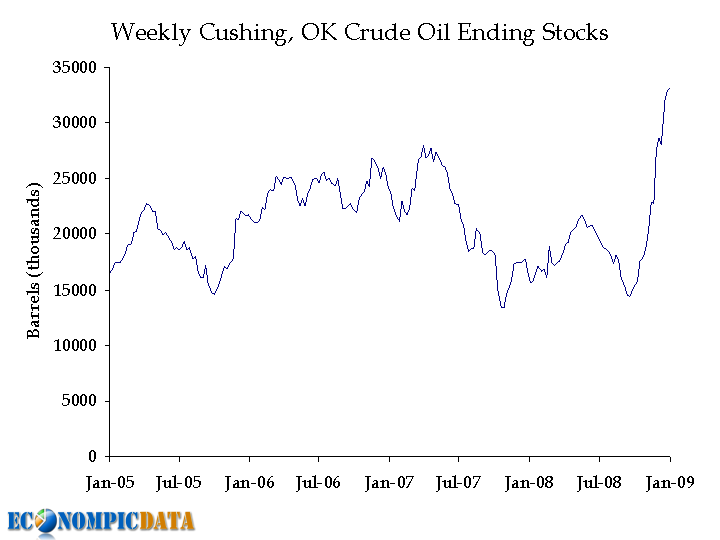
http://www.marketwatch.com/news/story/oil-ends-up-reversing-sharp/story.aspx?guid={8C543FB9-BF90-4C88-8E6E-98DE9FF162DE}
This suggests that maximum operating capacity is about 34 million barrels, meaning there is little room to add to storage tanks out in Cushing, according to Linda Rafield, senior oil analyst at Platts.
Es könnte interessant sein zu sehen, was mit dem WTI-Preis geschieht, sobald die Lager voll sind. Ich tippe auf Absturz.
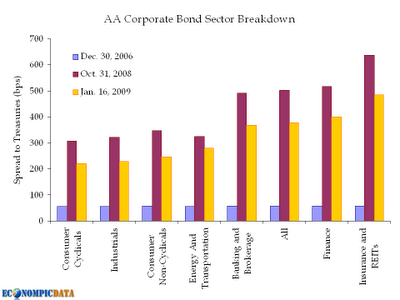
Also bear in mind the decline in expected inflation: real corporate rates are very high.
So yes, we do have a credit crunch. It’s not the whole story, but it’s part of the story.
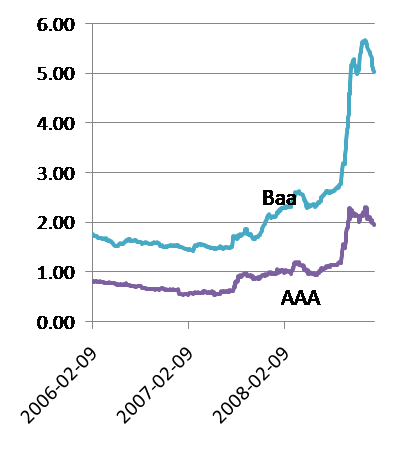
...
The disputed $700 million of debt in the Hancock battle is mezzanine debt that was divided up among nine investors. With real-estate values declining, not all of the investors would be paid off in a liquidation.
As a result, investors who believe they would be in the money are pressing for an immediate foreclosure ... Investors likely to lose out in foreclosure want to give Broadway more time to repay the loan.
Da schlagen sich die Gläubiger eines Fonds, der einen Kredit nicht bedienen konnte, darum, ob/wann da eine Zwangsvollstreckung gemacht wird.
Die Gläubiger, die eine Tranche haben, die voraussichtlich Geld bekommen würde, wünschen eine schnelle Zwangsvollstreckungen, und die Gläubiger, die voraussichtlich kein Geld aus der Vollstreckung bekämen, möchten dem Fond mehr Zeit geben, das Geld zurückzuzahlen.
Das hat sicherlich einiges Potential für interessante Diskussionen vor Gericht.
[...]
He declined to say if the Citigroup stake was part of the stakes it had shed, but said Kingdom's assets had fallen 44.4 percent to $13.3 billion.
So ganz passen die Zahlen nicht zusammen, aber so oder so: verheerend.
Factory sales fell 6.4 percent to C$48.4 billion ($38.5 billion), the lowest level since December 2004 and the biggest drop since data for the survey was first collected in 1992, Statistics Canada said today in Ottawa.
Die Zahl ist ja schön:
Ich melde hiermit allerdings schon mal Zweifel an. Wenn die Exporte im November, inflationsbereinigt in Yuan gerechnet, um 11.4% (siehe Chinas Exporte in Yuan gerechnet.) gefallen sind, und sich die Binnenkonjunktur im freien Fall befindet (siehe China\'s Silicon Valley faces tough time in financial crisis), dann sind diese 6.8% ein großes Wunder. Und die sind sehr, sehr selten.
Nun bin ich mit meinen Zweifeln nicht alleine.
http://www.rgemonitor.com/roubini-monitor/255237/the_chinese_devil_wears_prada_why_0_growth_is_the_new_size_68
Roubini hat auch eine schöne Erklärung für die Zahlen.
When growth is slowing down sharply the Chinese way to measure GDP is highly misleading as quarter on quarter growth may be negative while the year over year figure is positive and high because of the momentum of the previous quarters’ positive growth.
Indeed if one were to convert the 6.8% y-o-y figure in the more standard quarter over quarter annualized figure Chinese growth in Q4 would be close to zero if not negative.
Other data confirm that China was in a borderline recession in Q4 and that it may be in an outright recession in Q1: production of electricity plunged 7.9% in y-o-y basis; the Chinese PMI has been below 50 and close to 40 for five months now.
And with manufacturing being about 40% of GDP , manufacturing is certainly in a sharp recession (negative growth) and the overall economy may be close to a recession
So the 6.8% growth was actually a 0% growth – or possibly negative growth – in Q4; and the Q1 figures look even worse. So China is in a recession regardless of what the highly massaged official numbers claim.
Und auch Edward Hugh ist skeptisch:
http://fistfulofeuros.net/afoe/economics-and-demography/china-nears-recession-point-as-gdp-slumps/
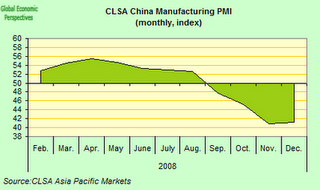
Nun sind Einkaufsmanagerindices sicherlich mit Vorsicht zu genießen, aber als Beschreibung der Grundstimmung der mittleren und großen Betriebe sind sie recht brauchbar.
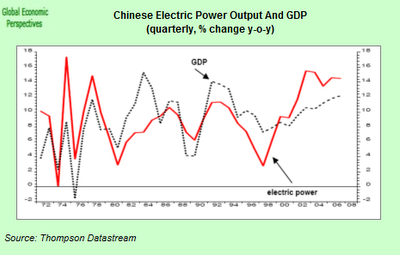
Korrelation zwischen Chinas BIP und der Stromerzeugung.
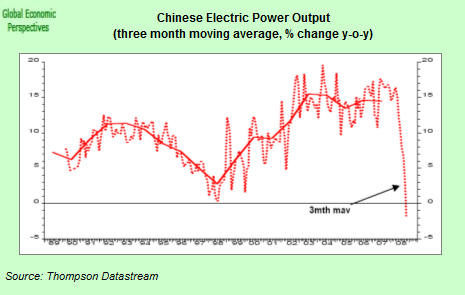
Stromerzeugung in China. Ein eindrucksvoller Absturz des Wachstums.
Edward Hugh stört sich etwas an den Daten über China:
Ich hab' hier mal die OECD-CLI-Daten einiger Ländern gegenübergestellt (Quelle):

China legt danach also den stärksten Absturz hin und wächst noch um 6.8%, während alle anderen in Rezession sind? Da ist wirklich eine neue Ökonomie am Werk, die mit unserer nichts mehr zu tun hat...
In Yuan gerechnet dürfte das noch ein klein bischen schlimmer sein (siehe Chinas Exporte in Yuan gerechnet.: Da wurden aus -2.2% inflationsbereinigt um die -11%).
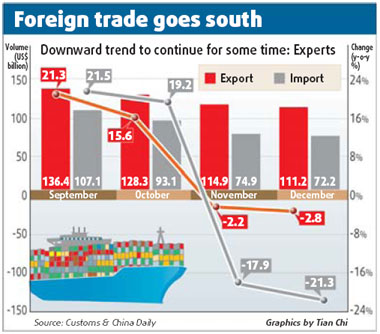
Daß es in "konjunkturellen Schwächephasen keine untypische Reaktion ist, das Kreditangebot zu verknappen", heißt eben nicht, daß es nicht verknappt ist bzw. wird.
Im Oktober hatte die BayernLB von 3 Mrd. Euro Jahresverlust gesprochen, im November hatte Kemmer angedeutet, dass die Landesbank tiefer in die roten Zahlen rutschen könnte. Die Bank wird vom Land Bayern mit 10 Mrd. Euro gestützt, ein Zusammenschluss mit der Landesbank Baden-Württemberg (LBBW) gilt als mögliches Szenario.
Mit 10 Mrd. kam die Bayern-LB übrigens nicht hin - das waren 10 Mrd. Eigenkapitalhilfe vom Land, 5 Mrd. Garantien vom Land, und irgendwann war noch von 15 Mrd. Garantien vom Bund die Rede, aber was aus denen geworden ist, weiß ich nicht.
Ich hoffe ja mal, daß die FTD da einer Ente aufgesessen ist:
Nach FTD-Informationen aus Eignerkreisen plant die Düsseldorfer Landesbank, Wertpapiere und nichtstrategische Aktivitäten mit einem Volumen von 70 bis 100 Mrd. Euro in eine neu zu gründende, externe Abwicklungsgesellschaft abzugeben. Entsprechende Vorschläge unterbreitete der WestLB-Vorstand am Mittwoch seinen Eigentümern - vor allem dem Land Nordrhein-Westfalen und den dortigen Sparkassen. Bislang war von einer Größenordnung von etwa 50 Mrd. Euro die Rede gewesen.
Als Kommentar zu dieser neuen Nachricht aus der WestLB fallen mir nur noch sehr unhöfliche bis vollständig beleidigende Worte ein.
Kinder, so einfach ist das nicht.
http://www.rp-online.de/public/article/wirtschaft/652288/Der-Kampf-um-die-WestLB.html
... und auch so ohne weiteres nicht versetzbar.
Und auch von anderen Mitarbeitern dürfte der eine oder andere nicht leicht in eine Gesellschaft versetzbar sein, die nach 5 Jahren aufhört zu existieren.
Zurück zur FTD:
Die Sparkassen hatten sich bislang gewehrt, weitere Garantien für die WestLB zu übernehmen. Sie und das Land NRW haften bereits mit bis zu 5 Mrd. Euro für ein ausgelagertes Wertpapierportfolio der WestLB von 23 Mrd. Euro. Viele Sparkassen, die selbst mit Abschreibungen im Eigenhandel zu kämpfen haben, sind jedoch an der Grenze ihrer finanziellen Belastungsfähigkeit angelangt.
Wenn man das mal hochrechnet, müßten für die 100 Mrd. rund 20 Mrd. Garantien erbracht werden.
Und so, wie ich die Arbeit der WestLB und ihrer Aufsichtsgremien beurteile (was ich allerdings nicht anhand der öffentlich via Salamitaktik verbreiteten Ergebnisse kann), kann man die 20 Mrd. und noch etwas mehr als Verlust abhaken.
Naja, 20 Mrd. sind ja nur 1100 EUR pro Landesbewohner. Ist ja Kleinkram.
WAZ -3.8%.
[...]
On the night of December 31, 2008 alone more than 80 vehicles were found at the airport. "Sixty cars were seized on the first day of this year," director general of Airport Security, Mohammed Bin Thani, told DNA over the phone. On the same day, deputy director of traffic, colonel Saif Mohair Al Mazroui, said they seized 22 cars abandoned at a prohibited area in the airport.
3000 Autos wurde am Dubai Airport in den letzten 4 Monaten zurückgelassen/aufgegeben. Das macht rund 25 am Tag - und bedeutet. daß der Gebrauchwagenmarkt in Dubai völlig kaputt ist.
Und dabei ist dann auch eine kleine Information über den Zustand des Immobilienmarkts von Dubai:
Die Straßenhändler Indiens spüren die Krise:
-50%.
Zwar fielen die Verkäufe von Digitalkameras um 50%, aber dafür besteht nun Interesse an Reperaturen...
Shareholders tapping the offer have until tomorrow to order stock priced at 3.083 euros a share, about 56 percent more than the current market value. UniCredit has lined up a group of new and existing investors to buy any leftover stock in the form of bonds that convert into shares and pay a coupon.
Ja, genau: Warum sollte jemand Unicredit 3 EUR für eine Aktie geben, die man auf den freien Markt für, naja, 1,26 EUR kaufen kann?
Eine zweite Frage: Warum sollte überhaupt jemand Aktien oder Wandelanleihen von Unicredit haben wollen? Masochisten mal außen vor lassend: Die werden in Osteuropa noch richtig viel auf die Nase bekommen.
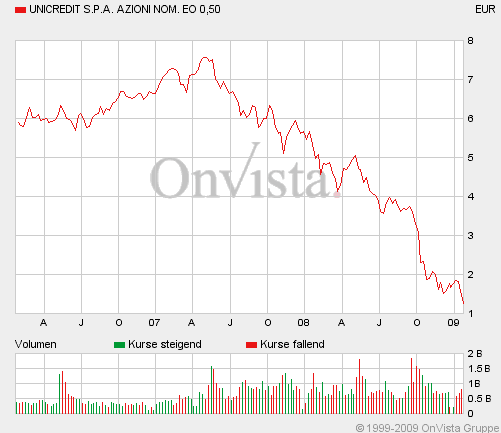
Chart von OnVista.
Exports plummeted 35 percent from a year earlier, the sharpest decline since 1980, the earliest year for which there is comparable data, the Finance Ministry said today in Tokyo. The December drop eclipsed a record 26.7 percent decline set the previous month. Economists predicted a 30.3 percent contraction.
Japans Exporte im Dezember 2008: -35% gegenüber dem Vorjahr.
Shipments to China slid 35.5 percent. Asia’s second-largest economy probably expanded 6.8 percent last quarter, the slowest pace in seven years, economists estimate a government report will show today. Exports to the U.S. dropped 36.9 percent and to Europe tumbled 41.8 percent.
http://econompicdata.blogspot.com/2009/01/dont-mention-decoupling.html
Ecomonpicdata hat die Exporte aufgearbeitet: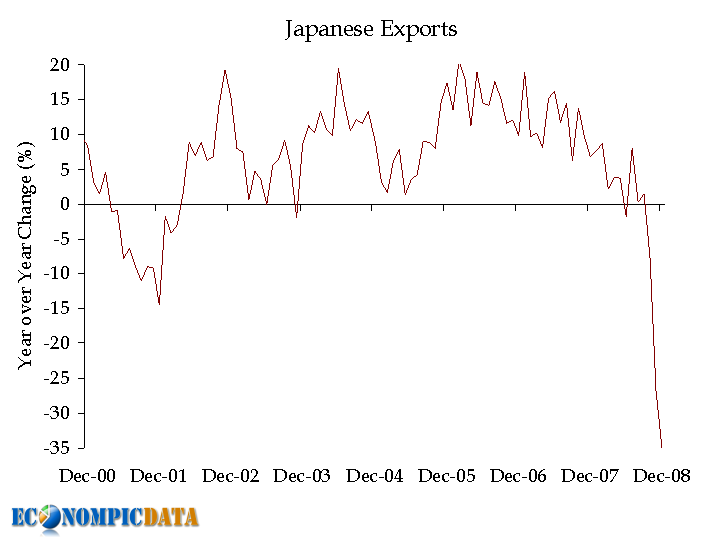
Für europäische Banken taucht ein neuer Krisenherd auf: das bislang boomende Geschäft in Osteuropa. Gründe sind der rapide wirtschaftliche Abschwung, die hohe Abhängigkeit von Krediten in Fremdwährungen und die schwierigen Refinanzierungsbedingungen in diesen Ländern.
[...]
Das enorme Kreditwachstum wird für westliche Banken nun zum Problem, denn die Qualität der Darlehen verfällt zusehends. Bei der Unicredit-Tochter Pekao und dem Osteuropageschäft der Ersten Bank machen Kredite in Zentral- und Osteuropa den Morgan-Stanley-Analysten zufolge rund das siebenfache des Kapitals der Bank aus, bei Raiffeisen International sogar etwa das neunfache.
Die Europäische Bank für Wiederaufbau und Entwicklung (EBRD) warnt, das hohe Engagement einiger westlicher Banken könne sogar ganze Länder mitreißen: So haben allein die österreichischen Banken in den Ländern Osteuropas Kredite von insgesamt 224 Mrd. Euro ausständig. Dies entspricht 78 Prozent der gesamten österreichischen Wirtschaftsleistung.
[...]
Gründe für den Anstieg der faulen Kredite in Osteuropa sind der wirtschaftliche Abschwung - und die Tatsache, dass Unternehmen wie Privatkunden viele Kredite in zinsgünstigen Fremdwährungen aufgenommen haben. Mit den Wertverlusten vieler Währungen drohen diese Darlehen notleidend zu werden.
Dieses Risiko bestehe vor allem in den baltischen Staaten, Ungarn, Rumänien und der Ukraine, warnen Analysten der Researchabteilung der Deutschen Bank in einer Notiz. In diesen Ländern liegt der Anteil von Darlehen in ausländischen Währungen demnach bei über der Hälfte. In Lettland und Estland beträgt er mehr als 80 Prozent. Der russische Rubel etwa hat in den vergangenen zwölf Monaten gegenüber dem Euro über 17 Prozent verloren, der polnische Zloty etwas unter 17 Prozent und der ungarische Forint rund 10 Prozent.
Da die Einlagen weit langsamer gewachsen sind als die Kredite, müssen sich die in Osteuropa tätigen Banken zu einem großen Teil an den Kapitalmärkten refinanzieren - was derzeit schwierig und teuer ist. Nach Angaben der EBRD haben Institute aus der Region bereits im ersten Halbjahr 2008 deutlich weniger Geld über Anleihe-Emissionen eingesammelt.
Das Thema wird langsam zeitungstauglich.
Und die nächste Krise beginnt:
In a statement Odlewnie said the filing was due to: "banking valuations resulting from the currency option deals which caused the value of our liabilities... to top the value of the company's assets". Last summer the Polish currency soared to a record high against the euro and many Polish companies took out hedging contracts, effectively betting on further zloty appreciation.
Die erste polnische Firma, die eine Wette auf steigenden Sloty gemacht hatte, verstirbt gerade.
Daß Gerhard Schröder nun Aufsichtsrat von TNK-BP ist, ist "gut für alle Aktionäre und für Rußland".
Das ist natürlich nur böse Nachrede. Es ist ganz bestimmt auch gut für die Kunden russischen Öls. Ganz sicher. So wie es gut ist, daß Schröder auch anderswo, und immer ganz mit der Meinung des Kremls konform gehend, die Interessen der Kunden Rußlands vertritt. Ex-Kanzler Schröder würde ja nie gegen unsere Interessen handeln (und Hartz IV ist gut für die betroffenen Kinder).
http://www.ftd.de/meinung/kommentare/:Leitartikel-Schr%F6der-der-Kurier-des-Zaren/461561.html
Mit anderen Worten: Der frühere Bundeskanzler wird als "unabhängiges Aufsichtsratsmitglied" de facto die Interessen des russischen Staates vertreten. [...] Aus deutscher Sicht aber ist es atemberaubend, wie selbstverständlich der Ex-Kanzler mittlerweile als Teil des russischen Establishments auftritt.
Seit Schröder seinen Job beim Pipelinekonsortium Nord Stream aufgenommen hat, hat er sich zu einer Art Edel-Regierungssprecher Russlands entwickelt. Noch nachvollziehbar wäre es gewesen, hätte er lediglich das Projekt Ostseepipeline vorangetrieben. Aber Schröder mischte sich überall ein, beim estnischen Denkmalstreit, im Konflikt um die Raketenabwehr und im Georgienkrieg. Und meist waren seine Stellungnahmen fast wortgleich mit denen der russischen Führung.
Wer das nicht für problematisch hält, der versteht die Rolle eines einstigen Regierungschefs falsch. Schröder gilt in der breiten deutschen Öffentlichkeit immer noch als neutrale Stimme, die im Streit mit Russland vermitteln kann. Gerade in Energiekonflikten wie dem jetzigen zwischen Moskau und Kiew wird oft nach dem Altkanzler gerufen. Aber Schröder wird in Osteuropa und übrigens auch in Russland selbst schon lange nicht mehr als neutral wahrgenommen. Er vertritt russische Interessen, und die stimmen nur durch Zufall manchmal mit denen Deutschlands oder der EU überein.
Frühere Bundeskanzler und Ex-Minister werden oft mit dem Titel Elder Statesman versehen. Schröder dagegen ist der Kurier des Zaren.
2005 waren laut Wikipedia Ölindustrie und verwandte Dienste für 40% des GDP verantwortlich. Das ist schon mal eine sehr unangenehme Abhängigkeit von einem Produkt.
2005 war der Ölpreis bei $54, 2006 bei 61, 2007 bei 64 und 2008 bei $123 (jeweils Jahresmittel, inflationsbereinigt).
Wenn das russische Wirtschaftswachstum schon bei einer Ölpreiserhöhung um $60/Barrel um 1% nachgelassen hat: Was wird es dann bei $-80/Barrel tun? Wenn gleichzeitig die Währungsreserven ausbluten? Wenn gleichzeitig jedes ausländische Geld abgezogen wird, was auch nur ansatzweise mobil ist?
Um 0 bis 2% wachsen? Doch nur in einem Paralleluniversum...
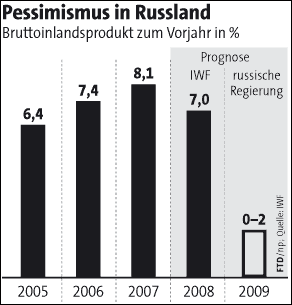
Ah, damit wird die Sache klarer: 0 bis 2 minus 13 => -11 bis -13% real in 2009.
Und dann paßt das insgesamt auch ganz gut zu den Berichten über die Industrieproduktion vom November 2008:
http://www.fxstreet.com/fundamental/economic-indicators/russia-industrial-production/2008-12-15.html
The development in industrial production is very negative for Russian growth. While rapidly declining PMI data in recent months indicated that the Russian economy would stall, we certainly did not expect to see such a large drop this soon. However, the data confirms our expectation that growth will contract in Q4 - and probably also in Q1 2009. This was also indicated last Friday by Deputy Economy Minister Andrei Klepach. Thus the worst still lies ahead, and we are currently adjusting down our 2.5% y/y growth forecast for 2009. The crucial question is whether there will be any growth in Russia at all next year?

http://russiatooat.blogspot.com/2009/01/vtb-bank-russia-gdp-indicator-shows-1.html
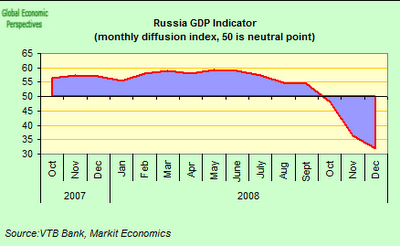
The currency has fallen 29 percent versus the basket since Aug. 1 and is now able to decline about 22 percent from a target rate, from about 3.6 percent on Nov. 11, the start of the current round of depreciation. The ruble weakened 1.4 percent to 37.8224 against the dollar-euro basket by 5 p.m. today in Moscow, extending this year’s drop to 6.7 percent. It depreciated to 43.8880 per euro, the lowest since the common currency’s introduction in 1999, and has lost 5.7 percent this year.
The ruble weakened 5.3 percent against the dollar and 9.8 percent versus the euro last week, the most since 1999. That compares with a record 71 percent slide in the week to Aug. 28, 1998, and a 42 percent slump the week after. Russia’s Mosprime rate, the average interest- rate banks charge to lend money to each other, rose to a two- month high of 12.5 percent today, according to the central bank.
Russia’s economy will probably grow more slowly this year than earlier forecast as the price of oil, the country’s chief export earner tumbles, according to Merrill Lynch & Co. Gross domestic product will probably expand 0.9 percent, rather than the previous projection of 3.7 percent, Merril’s Moscow-based economists Yulia Tsepliaeva and Ivan Bokhmat wrote in a report sent to clients.
“Russia has been unable to avoid the strongly negative impact of the global crisis and downward correction of commodity prices,” Tsepliaeva and Bokhmat said. “The inefficiency of the government plan and limited channels to deliver government support and liquidity to mid-sized companies make a hard landing scenario more and more likely for Russia.”
Nullwachstum können die sich real erhoffen - und das wären _sehr_ hoch hängende Trauben.
Update, 23.1.2009:
http://fistfulofeuros.net/afoe/economics-and-demography/russias-industrial-output-reserves-and-currency-all-slump-together/
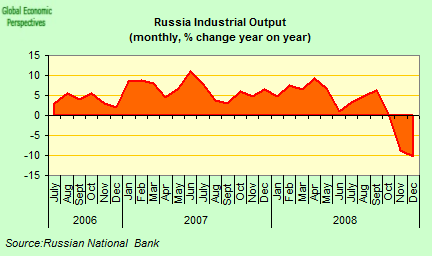
Analysts said the move would prompt an immediate drop in the currency's value.
The bank said the limit of the band, measured against a two currency "basket" of dollars and euros, will be set at 41 rubles as of Friday.
Und das, nachdem Rußland um die 200 Mrd. Dollar beim Versuch verloren hat, den Rubel zu stützen.
http://econompicdata.blogspot.com/2009/01/russian-reserves-sink.html
Econompicdata hat diese Graphik der Währungsreserven gemacht: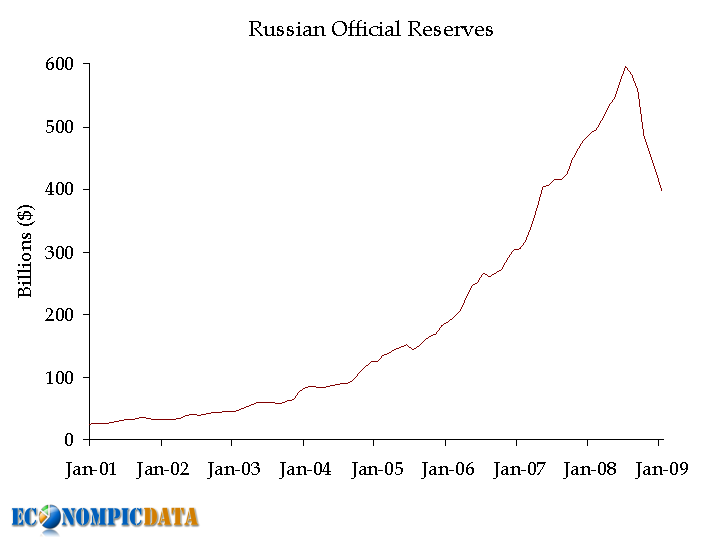
http://waehrungen.onvista.de/charts.html?PERIOD=6&DISPLAY=1&SCALE=1&GRID=1&SUPP_INFO=0&VOL=0&ID_CURRENCY_FROM=EUR&ID_CURRENCY_TO=RUB#chart1
OnVista liefert diesen Verlauf des Wechselkurses EUR / Rubel: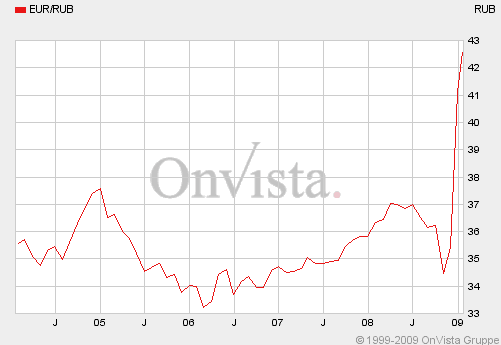
Rußland hat all das, was es in anderthalb Jahren hoher Öl- und Gaspreise gewonnen hat, bereits wieder verloren...
Update, 23.1.2009:
http://fistfulofeuros.net/afoe/economics-and-demography/russias-industrial-output-reserves-and-currency-all-slump-together/
Some of last weeks decline can be attributed to the dollar’s 1.5 percent gain against the euro in the week ended January 16, since this means a fall in the dollar value of the other currencies in the reserves. Evgeny Nadorshin, senior economist at Moscow’s Trust Investment Bank, estimates that about $18.3 billion of the drop can be accounted for by central bank interventions last week.
(The reserves are made up of 44 percent euros, 45 percent dollars, 10 percent pounds sterling and 1 percent yen).
Wenn man die Kapriolen bedenkt, die der Dollar seit dem Sommer macht, ist der Fall der Währungsreserven nur auf Dollarbasis so stark wie er aussieht.
The Singapore economy shrank in the fourth quarter at a seasonally adjusted, annualised pace of 16.9 per cent, deeper than advance estimates of a 12.5 per cent contraction, detailed government data showed on Wednesday.
Ich wünsche es euch, aber glauben kann ich das nicht.
http://paul.kedrosky.com/archives/2009/01/21/singapore_thing.html
Nothing like playing catchup with downbound economic weakness, as evidenced by this series of GDP releases from Singapore. In the extreme case, Singapore has gone, in two months, from forecasting GDP up 2.0% to GDP down 5.0%, a 700 basis-point swing.
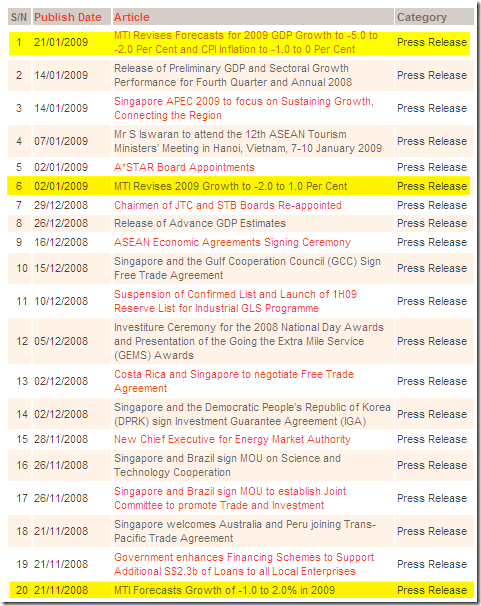
Exports in December fell 21 percent from a year earlier to 10.5 billion Singapore dollars ($7.0 billion) as consumer demand from Europe, China and the U.S. plummeted, according to Trade and Industry Ministry figures released Friday. Exports fell 13 percent in December from the previous month.
Singapur erwartet ja bekanntlich ein Wirtschaftswachstum von -2 bis -5% für 2009, aber diese Exportzahlen lassen das um so mehr wie einen Wunschtraum erscheinen, insbesondere in Anbetracht dieses Faktums: Singapore's non-oil exports, which account for two-third of the city-state's gross domestic product.
The country's gross domestic product (GDP) also contracted 3.4 percent from a year earlier, the Bank of Korea (BOK) said. The quarter-to-quarter performance contrasts with a 0.5 percent expansion in the third quarter.
Südkoreas BSP im Q4 2008: -3.4% gegenüber Vorjahr.
Private consumption, one of the main growth engines of the Korean economy, fell 4.8 percent in the fourth quarter, compared with a 0.1 percent gain in the preceding three months. It was the lowest level since the first quarter of 1998 when consumer spending dipped 14.6 percent.
Warenexporte: -11.9% gegenüber Quartal 3.
Konsum: -4.8% gegenüber Quartal 3.
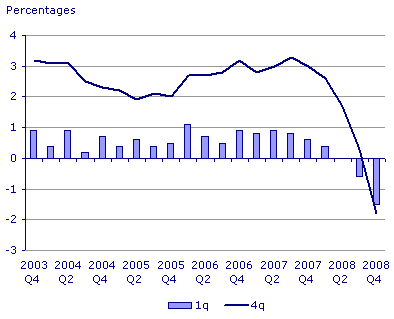
1.1 per cent in the third quarter. Electricity, gas and water output decreased by 0.2 per cent, compared with a fall of 0.6 per cent in the previous quarter.
Schlecht.
Und sogar die Staatsdienstleistungen fallen:
Einziger positiver Bereich:
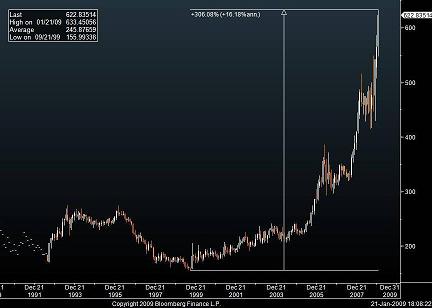
Jetzt wäre der richtige Zeitpunkt, das britische Gold zu verkaufen - wenn es denn noch nicht verkauft wäre:
http://www.timesonline.co.uk/tol/news/politics/article1654931.ece
http://globaleconomicanalysis.blogspot.com/2009/01/pound-sinks-as-britain-teeters-on-edge.html
Das britische Pfund hat bereits seinen Absturzrekord von 1992 locker übertroffen. Hier wird es im Vergleich zu einem Währungskorb gezeigt: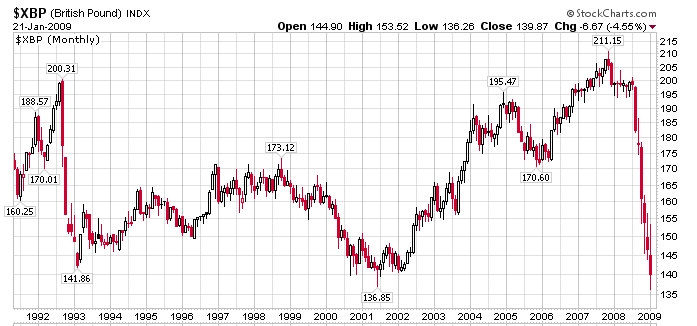
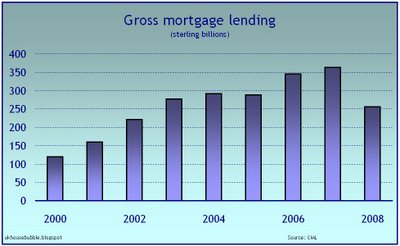
2008 waren es rund 100 Milliarden Pfund weniger als 2007 - und das trotz relativ großzügiger Bankenrettungen.
It is why sterling has crashed 10 cents from $1.49 to $1.39 against the dollar in two days. The markets have given their verdict on Gordon Brown's latest effort to "save the world".
Credit default swaps (CDS) measuring risk on British debt have reached an all-time high of 125 basis points, just below Portugal. The yield spread on 10-year Gilts over German Bunds has doubled to 53 basis points since last week.
Nunja, ich spreche ja schon länger vom zukünftigen Armenhaus Europas, wenn ich über Großbritannien rede, aber daß ausgerechnet Ambrose Evans-Pritchard meinen Pessimismus noch übertrifft, hätte ich nie erwartet.
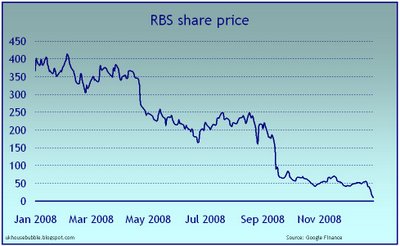
Offensichtlich geht's der RBS nicht ganz gut. Aber der Aktienkurs ändert nichts am eigentlichen Problem mit der RBS - nämlich der Tatsache, daß die alleine den britischen Staat ganz tief in die Miesen ziehen kann:
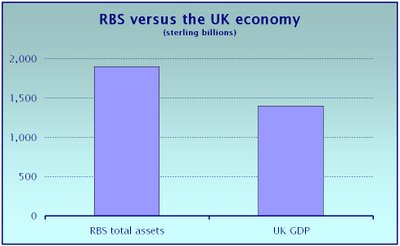
“I’ve found that credit losses could peak at a level of $3.6 trillion for U.S. institutions, half of them by banks and broker dealers,” Roubini said at a conference in Dubai today. “If that’s true, it means the U.S. banking system is effectively insolvent because it starts with a capital of $1.4 trillion. This is a systemic banking crisis.”
Hm, ja, aber war das nicht sowieso klar? Auch wenn's keiner aussprach?
Das Interessantere daran: Wo liegen eigentlich die anderen 1800 Mrd, wenn sie nicht dem US-Finanzsystem auf den Kopf fallen?
Oil prices will trade between $30 and $40 a barrel all year, Roubini predicted.
“I see commodities falling overall another 15-20 percent,” Roubini said. “This outlook for commodity prices is beneficial for oil importers, it’s going to imply that economic recovery might occur faster, but from the point of view of oil exporters, this will be very negative.”
Der Mann ist sicherlich kein Rohstoffbulle
Aber genau so _kann_ das kommen.

Harvard wollte Anteile an Private-Equity-Fonds verkaufen, und hat das nicht getan - weil die Gebote zu niedrig waren.
The university’s $28.8 billion endowment, the richest in higher education, rejected deals as sellers, including schools and pension funds, flooded the market and pushed down prices, said the people, who asked not to be identified because the bidding is private. The Cambridge, Massachusetts university remains interested in unloading the private-equity investments.
Single-family starts were at 398 thousand in December; also the lowest level ever recorded (since 1959). Single-family permits were at 363 thousand in November, suggesting single family starts may fall even further next month.

Die einzige positive Betrachtungsweise: Es kann so nur noch ein Jahr lang weiter fallen.
Mason counted 1,228 homes listed for under $10,000, 209 of which were under $1,000.
"Many of them are in pretty decent shape," he said, "and some can be lived in."
Detroit, vor der Pleite der großen Drei: Medianpreis der verkauften Häuser im Dezember 2008: $7500.
Enormous buildings sit vacant downtown, their hulking shadows darkening city streets at night. Unemployment is tallied in double digits. And this is how it is before Chrysler, General Motors, Ford and associated companies possibly file for bankruptcy this year.
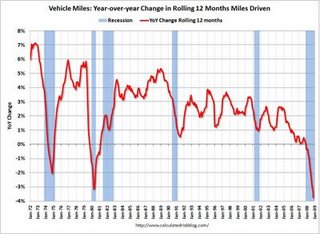
Cumulative Travel for 2008 changed by -3.7% (-102.1 billion vehicle miles). The Cumulative estimate for the year is 2,656.2 billion vehicle miles of travel.
Insgesamt scheint die Wirkung der fallenden Spritpreise nahe 0 zu liegen.
US-Reichtum pro Kopf, inflationsbereinigt, Staatsschulden eingerechnet:
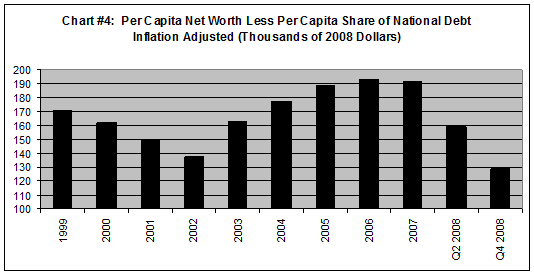
Aber selbst wenn man die Staatsschulden nicht einrechnet, sieht es nicht viel besser aus: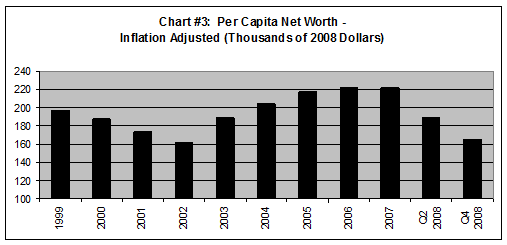
Dann sind die USA jetzt etwa auf dem Stand von 2002 - und atemberaubend ist die Sturzgeschwindigkeit.
From Mr Thomas Janichen.
Sir, Why create another bad bank? We have enough already.
Wie wahr, wie wahr.
Gruß, Uwe
Wollen Sie den Digest abbestellen?